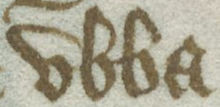
Ubba (Old Norse: Ubbi; died 878) was a 9th-century Viking and one of the commanders of the Great Heathen Army that invaded Anglo-Saxon England in the 860s.[note 1] The Great Army appears to have been a coalition of warbands drawn from Scandinavia, Ireland, the Irish Sea region and Continental Europe. There is reason to suspect that a proportion of the Viking forces specifically originated in Frisia, where some Viking commanders are known to have held fiefdoms on behalf of the Franks. Some sources describe Ubba as dux of the Frisians, which could be evidence that he also associated with a Frisian benefice.
In 865, the Great Army, apparently led by Ivar the Boneless, overwintered in the Kingdom of East Anglia, before invading and destroying the Kingdom of Northumbria. In 869, having been bought off by the Mercians, the Vikings conquered the East Angles, and in the process killed their king, Edmund, a man who was later regarded as a saint and martyr. While near-contemporary sources do not specifically associate Ubba with the latter campaign, some later, less reliable sources associate him with the legend of Edmund's martyrdom. In time, Ivar and Ubba came to be regarded as archetypal Viking invaders and opponents of Christianity. As such, Ubba features in several dubious hagiographical accounts of Anglo-Saxon saints and ecclesiastical sites. Non-contemporary sources also associate Ivar and Ubba with the legend of Ragnar Lodbrok, a figure of dubious historicity. Whilst there is reason to suspect that Edmund's cult was partly promoted to integrate Scandinavian settlers in Anglo-Saxon England, the legend of Ragnar Lodbrok may have originated in attempts to explain why they came to settle. Ubba is largely non-existent in the Icelandic traditions of Ragnar Lodbrok.
After the fall of the East Anglian kingdom, leadership of the Great Army appears to have fallen to Bagsecg and Halfdan, who campaigned against the Mercians and West Saxons. In 873, the Great Army is recorded to have split. Whilst Halfdan settled his followers in Northumbria, the army under Guthrum, Oscytel and Anwend struck out southwards and campaigned against the West Saxons. In the winter of 877–878, Guthrum launched a lightning attack deep into Wessex. There is reason to suspect that this strike was coordinated with the campaigning of a separate Viking force in Devon. This latter army is reported to have been destroyed at Arx Cynuit in 878. According to a near-contemporary source, this force was led by a brother of Ivar and Halfdan, and some later sources identify this man as Ubba himself.
- ^ Hervey (1907) p. 458; Horstmann (1881) p. 402 bk. 2 § 319; Harley MS 2278 (n.d.)
- ^ Costambeys (2004b).
- ^ Barrow (2016); Bartlett (2016); Lewis (2016); Jordan, TRW (2015); McTurk, R (2015); Lapidge (2014); Lazzari (2014); Cammarota (2013); Emons-Nijenhuis (2013); Mills, R (2013); Gigov (2011); Pinner (2010); Finlay (2009); Ridyard (2008); Rowe, EA (2008); McTurk, R (2007); Winstead (2007); McTurk, R (2006); Fjalldal (2003); Schulenburg (2001); Foot (2000); Frederick (2000); Halldórsson (2000); Hayward (1999); Keynes (1999); Pulsiano (1999); Whitelock (1996); Gransden (1995); Townsend (1994); Rowe, E (1993).
- ^ Coroban (2017); Barrow (2016); Bartlett (2016); Gore (2016); Lewis (2016); IJssennagger (2015); McGuigan (2015); Pinner (2015); Downham (2013a); McLeod, SH (2011); Pinner (2010); Cawsey (2009); Edwards, ASG (2009); Finlay (2009); Hayward (2009); Ridyard (2008); Woolf (2007); McLeod, S (2006); Adams; Holman (2004); Costambeys (2004b); Crumplin (2004); Kries (2003); Halldórsson (2000); Rigg (1996); Gransden (1995); Abels (1992); Rigg (1992).
- ^ Parker, EC (2012); Fornasini (2009).
- ^ Barrow (2016); Gore (2016); Parker, E (2016); Roffey; Lavelle (2016); IJssennagger (2015); Parker, E (2014); Reimer (2014); Abels (2013); IJssennagger (2013); Parker, EC (2012); Gigov (2011); Cubitt (2009); Fornasini (2009); Rowe, EA (2008); Cubitt; Costambeys (2004); Keynes; Lapidge (2004); Kleinman (2004); Smyth (2002); Smyth (1998); Frankis (1996); Yorke (1995).
- ^ Somerville; McDonald (2014); Emons-Nijenhuis (2013); McLeod, SH (2011); Finlay (2009); Levy (2004); Kries (2003); Davidson; Fisher (1999); Swanton, MJ (1999); Rowe, E (1993).
- ^ McTurk, R (2015); IJssennagger (2013); Rowe, EA (2008); McTurk, R (2006).
- ^ McTurk, R (2015); McTurk, R (2007).
Cite error: There are <ref group=note> tags on this page, but the references will not show without a {{reflist|group=note}} template (see the help page).